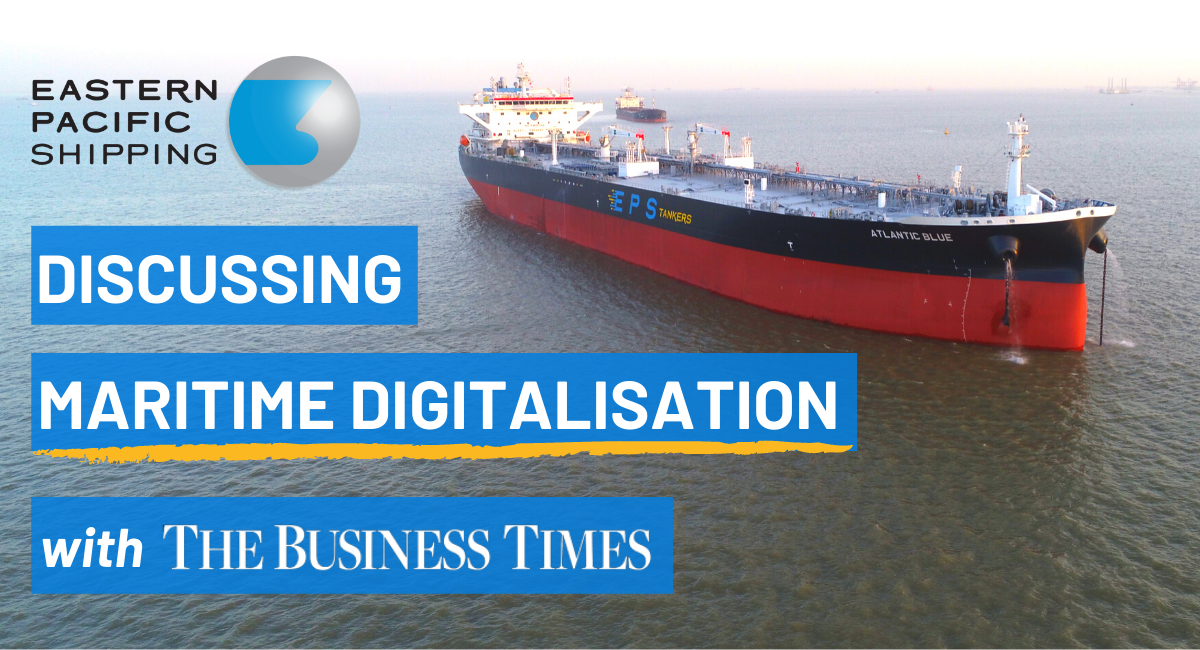Talking Maritime Tech with The Business Times
14 May 2021

EPS CIO Claus Nehmzow sat down with Southeast Asia’s leading financial news publication, The Business Times. The insightful article dives into our company’s pursuit of cutting-edge innovation, our Life at Sea Programme, and more!
What does digitalisation rally mean for the shipping industry?
DURING the recent Singapore Maritime Week we heard a lot about the need to transform the maritime industries and, consequently, the relevance of digitalisation. But what does that really mean?
Singapore-headquartered Eastern Pacific Shipping (EPS) operates a mixed fleet of container ships, dry bulkers and tankers totalling 17 million deadweight-tonnes.
The company’s chief innovation officer Claus Nehmzow agreed to answer my questions on how his company is changing to meet new challenges.
So, what is EPS doing to digitalise its operations and processes? The reply was that EPS is committed to the green and technology-driven growth of the shipping industry. “Our innovation efforts aim to benefit not only ourselves but also the entire sector in terms of sustainability and emission reduction, health and safety for our seafarers and general economics and efficiencies,” added Mr Nehmzow.
He explained: “The main way EPS is pursuing innovation is through our maritime accelerator programme, jointly operated with Techstars. This programme has selected 18 companies in our first two years of operations. Through intensive internal and external mentoring and trials on our vessels, these startups have been able to fine-tune their product offerings, raise additional funding, and obtain broad recognition by regulators, ship owners and managers, port authorities, and more.
“Key priorities of the programme include finding ways to enhance operational efficiencies while reducing CO2 and other greenhouse gas emissions. Lowering fuel consumption, reducing single-use plastic, and improving health and safety onboard are also key areas of focus of our programme.”
How are current processes being streamlined? The answer was that EPS is “moving away from legacy systems, both obsolete software packages and in-house developed applications, previously hosted on premises, towards modern best-of-breed cloud-based software solutions, and this allows us to be more flexible, taking advantage of software improvements that vendors introduce regularly.”
Powerful tool
Doing that required selecting a systems provider. For EPS, with over 190 application systems across the company, “having one source of truth was critical and for the company Oracle Fusion Cloud ERP and EPM became the obvious choice”.
According to Mr Nehmzow, this system integrates with EPS’ operational systems eliminating manual touchpoints and transaction processing. This ensures standardised and automated business processes, which is a powerful tool driving business excellence.
Does digitalisation mean a smaller workforce? It does not appear so. He noted: “EPS’ digitalisation strategy is about empowering our people by reducing manual, repetitive, and error-prone tasks. For example, technologies like Robotic Process Automation (RPA) allows people to have more time to focus on higher value-added analytical tasks and deal with the increased workload stemming from our growing fleet size.”
According to Mr Nehmzow, the ultimate goal with digitalisation is to improve economics and efficiencies (which will go hand-in-hand with emission reductions) of the end-to-end supply chain. “The technology capabilities we are creating internally, through data lakes and API sandboxes, will allow us to integrate with partners and customers, such as charterers, for the benefit of the whole industry beyond our traditional shipping industry horizon. All these initiatives require people to drive them, so if anything, we will be looking to bring in more people with deep knowledge in these areas to ensure proper execution.”
Managing stress and fatigue
All this sounded fine but I wanted to bring the discussion down to the reality of what happens at sea, on the ships. “What is EPS doing to help employees avoid fatigue?” I asked.
Mr Nehmzow replied: “A vast majority of our 5,500 strong workforce are seafarers, and their physical and mental well-being are our top priority. To address this, and to prevent the onset of fatigue, we developed the EPS Life at Sea Programme. This includes upgrading accommodations onboard to modern and inclusive spaces, increasing connectivity to stay in touch with loved ones, and installing state-of-the-art gymnasiums fleet-wide. In addition, we launched an internal social network that connects all employees on a single communications platform. A dedicated culinary consultant provides weekly menus and upskilling training to our chefs onboard while a dedicated pair of gym coaches design interactive physical readiness routines. This suite of benefits has proven to boost morale, drive culture, and help manage stress and fatigue.”
OK, but pushing a bit further, how can the workload of senior officers be reduced? Mr Nehmzow said: “EPS aims to leverage technology to improve efficiencies across the board, which should reduce the workload and stress for many people. For example, one of the startups from the second year of our Accelerator, Kanda from Denmark, has developed a Virtual Reality (VR) based industrial training platform. EPS and others are using this to train global workforces in a multi-user collaborative environment. At EPS, we are using it to train our team how to operate next-generation vessels, such our dual-fuel LNG fleet. This approach allows colleagues and instructors to learn and work together in a virtual environment, from anywhere in the world, at their own time and pace.”
EPS is a big ship manager and is clearly investing significantly to address the challenges it sees coming along the track. Not all companies have the same resources or the same views of what is required.
One thing is clear. Changes of all sorts are being forced on the industry. For commentators like your columnist, this makes for an interesting shipping scene. For those who have to make the difficult investment decisions, “interesting” is probably not the word they would choose.

